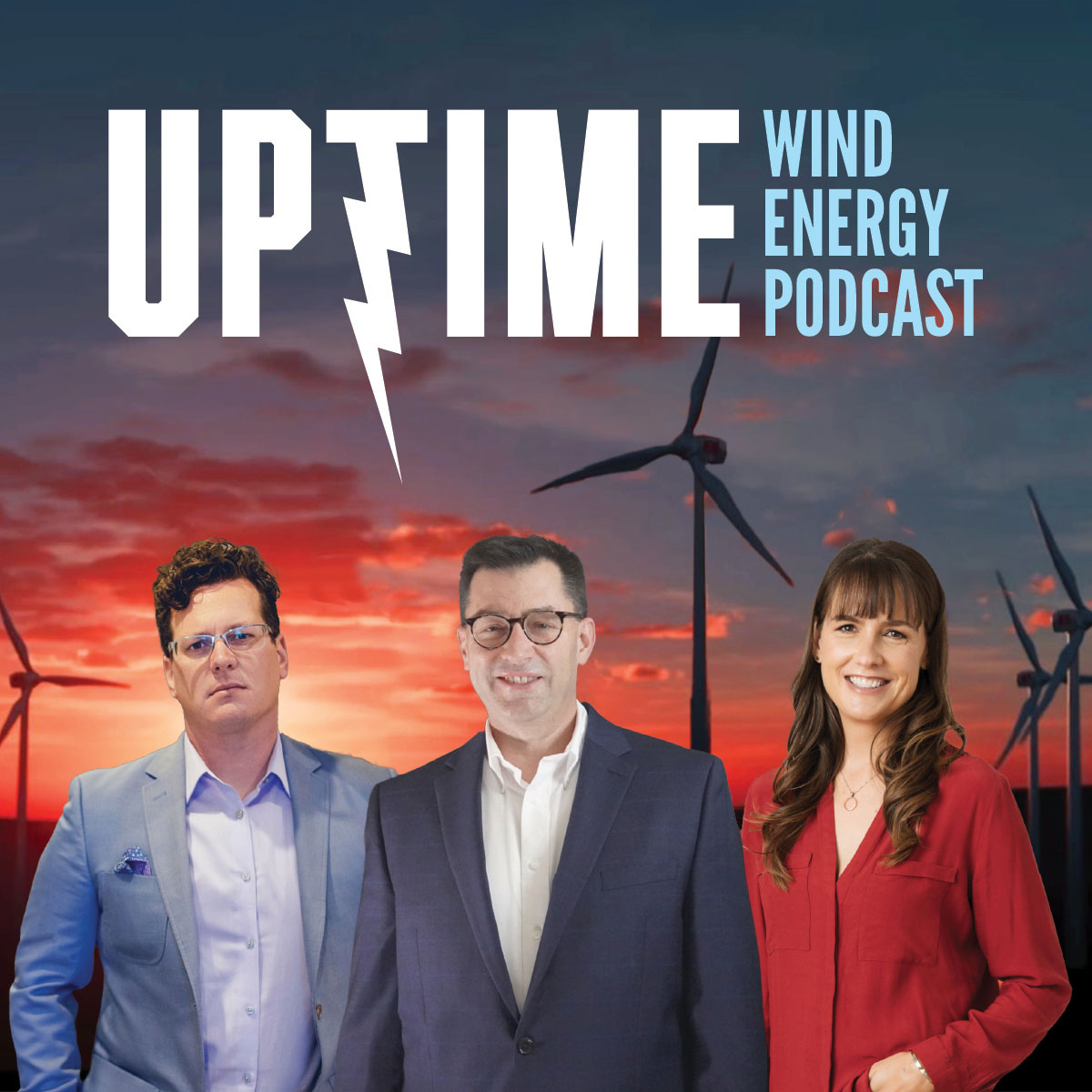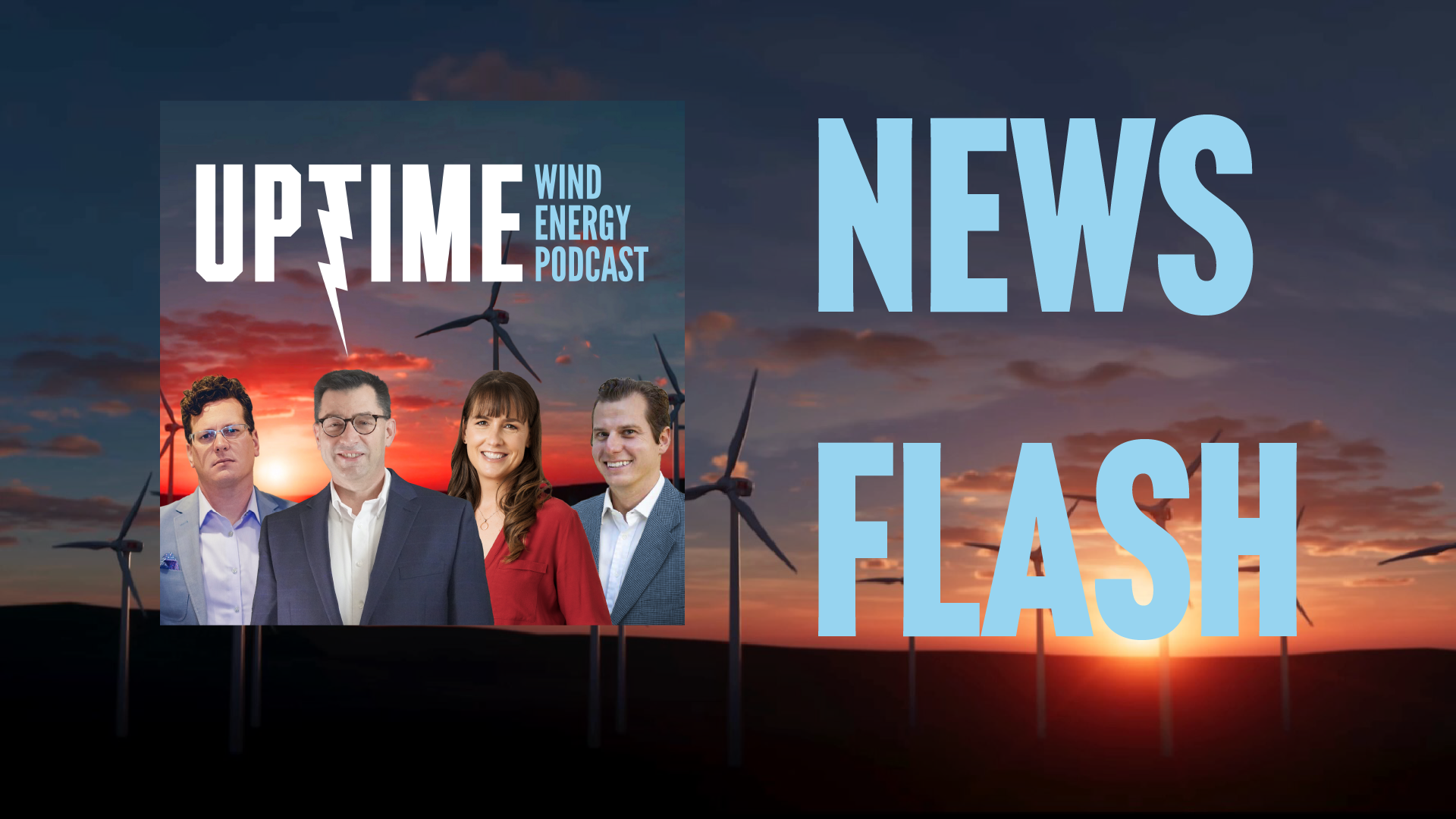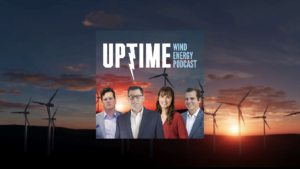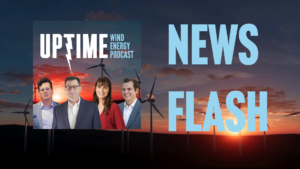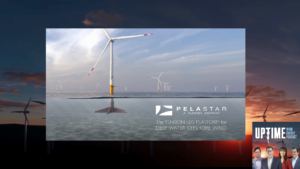Podcast: Play in new window | Download
New Jersey has created the New Jersey Green Bank to support the state’s clean energy projects. Hellenic Cables Americas has been allocated a $58 million tax credit for its planned cable factory in Baltimore, Maryland. Vestas decides not to lower prices in order to turn a profit. Masdar is planning a possible entry into the Chinese renewable energy market.
Sign up now for Uptime Tech News, our weekly email update on all things wind technology. This episode is sponsored by Weather Guard Lightning Tech. Learn more about Weather Guard’s StrikeTape Wind Turbine LPS retrofit. Follow the show on Facebook, YouTube, Twitter, Linkedin and visit Weather Guard on the web. And subscribe to Rosemary Barnes’ YouTube channel here. Have a question we can answer on the show? Email us!
Pardalote Consulting – https://www.pardaloteconsulting.com
Weather Guard Lightning Tech – www.weatherguardwind.com
Intelstor – https://www.intelstor.com
Allen Hall: I’m Allen Hall, president of Weather Guard Lightning Tech. And I’m here with the founder and CEO of IntelStor, Phil Totaro, and the chief commercial officer of Weather Guard, Joel Saxum. And this is your NewsFlash. NewsFlash is brought to you by our friends at IntelStor. If you want market intelligence that generates revenue, then book a demonstration of IntelStor at IntelStor. com.
The New Jersey Economic Development Authority Board has created the New Jersey Green Bank to support the state’s clean energy transition. The Green Bank will use various financial tools such as debt and credit enhancements to invest and attract private capital for New Jersey’s clean energy sector.
The bank will focus on projects, technologies, and companies that support the state’s climate goals. Particularly in areas like zero emission transportation, building decarbonization and resiliency, and clean energy generation and storage like wind energy. Phil, this is unique for the United States where a separate state has created a bank to fund renewable projects.
Philip Totaro: Yeah, this is really interesting and compelling that other states have tried employing other forms of investment vehicles to try and park money into project development, but this is a pretty unique thing where they’re going to specifically focus on clean energy. And, do it with it sounds like the help of federal funding that they’ve been able to obtain.
This is going to be great for offshore wind and battery storage technology, I think, deployed throughout the state of New Jersey. All in all I think this is a win.
Joel Saxum: Yeah, I like the in the press conference here, they state each investment made by the NJGB must demonstrate benefits for New Jersey.
Great, it’s their state, it’s their money. But, this is the part I like. It must be new, rather than refinance and reduce greenhouse combustion greenhouse gas emissions or other pollutants. So it has to have, measurable effect for helping the climate out. And it must be new, so it’s putting new things out there.
And I know like New Jersey right now is actually pretty heavy on doing quite a few solar installations as well. A lot of good things coming there. I would like to see other states put this into place.
Allen Hall: Helena Cable Americas, a subsidiary of Synergy Holdings. has been allocated a 58 million tax credit for its planned cable factory in, of all places, Baltimore, Maryland.
The company intends to build a 300 FID, that will manufacture subsea and underground cables for offshore wind and power grid applications. Helena Cable America successfully applied to the Department of Energy and received an allocation letter from the IRS granting its request for a qualifying advanced energy project transferable tax credit, or as we call it IRA 48C.
Now Phil, the IRA 48C, we haven’t experienced a lot of that yet. Helena Cable’s is one of the early entries there. What do you think so far?
Philip Totaro: So this is great. And actually Hellenic wasn’t the only company to get this. LS Cable and System from Korea also got, I think it was 99 million on top of this.
So for both companies, really fantastic news. And the fact that they’re leveraging the 48C, so just to be clear too the 45X manufacturing tax credits are really geared towards the wind turbine component of the system. manufacturers. The 48C is something that technically you can still qualify for if you’re a wind turbine manufacturer, but it’s probably more lucrative to go for the 45X.
So it’s leaving more 48C funds available for companies that aren’t explicitly manufacturing wind turbine components, but they are manufacturing something that is going to help facilitate offshore wind project development like cables, inter array and export cables. So this is fantastic news for Hellenic.
It’s fantastic news for LS Cable and System. And great to see these companies taking advantage of and the federal government playing ball and giving them the opportunity to, create jobs and create factories here in, in the U. S.
Joel Saxum: Big focus there, Phil, I would like to say, in Baltimore, focusing on jobs, right?
That area is, could use some, for sure. An odd twist on this one in the next eight weeks, they’re looking to close on the property acquisition there on Wagner’s Point, because, of course, if you’re an offshore cables facility. You need to be able to pull up cable vessels to the facility and load the cable onto the vessels and then go off shore.
However, the property that they’re looking at is upstream, behind the Francis Scott Key Bridge, which is currently In the water. So that may put a little bit of a wrinkle into their plans.
Allen Hall: Vestas will be holding on to recent price gains rather than passing on savings to customers in order to bolster earnings.
The wind turbine industry is focusing on turning a profit and not passing on costs cuts to customers as the sector needs to grow significantly to meet government goals for limiting climate change. Vestas chairman Andres Runevard states that wind power is already competitive and cheap enough, so there is no need.
Need to lower prices. Now, despite raising prices, Vestas has had a record number of new orders last year and with the industry broadly in recovery, there seems to be a little pressure from competition to shrink the margins. Rudevide believes that the wind industry should focus on ensuring that all players behave responsibly as there is no longer pressure from the competition
cost of energy perspective of fossil fuels. Now, Phil, this is a unique perspective from the Vestas chairman. Do you think it’ll hold, that they can continue to keep prices up in the long term or short term?
Philip Totaro: I think Anders said the quiet part out loud. Normally you don’t tell people that you’re gonna, I keep charging them a high price and hold on to margins but, good on them if they’re able to actually get away with it. The reality is that even though the Chinese have put price pressure on the Western OEMs in certain markets in most, Western markets, certainly the U. S., Western Europe, et cetera prices have gone up mostly because of, the interest rate and inflation thing that we’ve talked about before on the show, but also raw material costs and the fact that raw material costs are stabilizing inflation has stabilized now and Project CapEx also is still right around about 1.
million a megawatt at this point on average. So you’re seeing everything get to get to a point where it’s stable. So the fact that Vestas has the opportunity to try and hold on to a little more margin, great for them. But eventually they’re going to have a margin squeeze put on them by not only Chinese competitors, but also other Western OEMs.
And the developers are always out to find the best possible deal they can. So they’re going to find ways of leveraging. Whether it’s threatening to, to do businesses with the Chinese OEMs or, some other mechanism, I’m sure that the developers are going to try and, claw back some of that some of that margin that Vestas is trying to hold on to.
Joel Saxum: I think in the back of the mind of every one of these Western OEMs is, when is the next problem going to pop up? Vestas is not immune from this. A couple years ago, they paid out hundreds of millions of dollars in on some settlements to developers based on some issues that the turbines had.
You’re seeing Siemens go through it now. GE’s had their issues. Everybody’s had their issues at some point in time with serial defects or some of these other things. If you have the chance to put a little bit more cash in the coffers just in case something pops up in the future, my bet would be just to do it.
Allen Hall: Abu Dhabi clean energy company Masdar is planning a possible entry into China, the world’s largest renewable energy market, as part of its goal to reach a renewable energy capacity of 100 gigawatts by 2030. Masdar’s chief operating officer believes that any serious investor ignoring China is Committing a quote very strategic mistake master is active in 40 countries and aims to expand its capacity From about 20 gigawatts currently to at least 100 gigawatts by the end of the decade Phil this has global implications Masdar is trying to change the world on the way it operates in regards to energy, operating in the UK, which they are doing, and operating in China simultaneously has to raise some concerns, right?
Philip Totaro: This is earth shattering news. If they actually go through with it, keep in mind that right now, China has something like 38 plus gigawatts of offshore wind already operational and more to come. And Mazda has obviously been a pretty big investor in offshore, but also other renewables.
Solar wind. You think about, the solar and energy storage capacity that, that China’s trying to add, that is, that’s huge news. This, plus the other aspect of this, where every dollar that they spend in China is a dollar less that they have to spend anywhere else in the world.
So that’s one, thing that might concern the west. But the other reality is that, yeah, this stuff like this hastens China’s rise in terms of global prominence and an economic power. So the. The reality is that, you can try to do what the European Union is doing right now with countervailing duties and protectionist activity to, to try and, maintain your position in the world.
But the reality is the people that are going to have control are the ones who are capable of and are necessarily investing in creating something, creating wealth, creating opportunity, creating markets. And if mass star goes to China. That is absolutely what they’re going to be doing. If the UK or other countries don’t want Masdar to go to China and spend so much money over there, then they need to incentivize Masdar to come to make foreign direct investment in western markets more viable.
Joel Saxum: Yeah, 100 percent agreed, Phil. One of the issues I see here is when you start playing back and forth in the geopolitical climate we’re in right now, With money going to China, money coming to, cause Mazda is active in the U S as well. If they’re playing on both of those markets, eventually there’s that information starts to flow back and forth.
And that is something that the United States government for one Western economy does not like is information flowing back and forth with China, whether it’s technical, technological or economic. So they, while they are holding the cards, like you say, Phil, they’ve got the capital there and they’re deploying it.
It’s going to start to raise some eyebrows.

